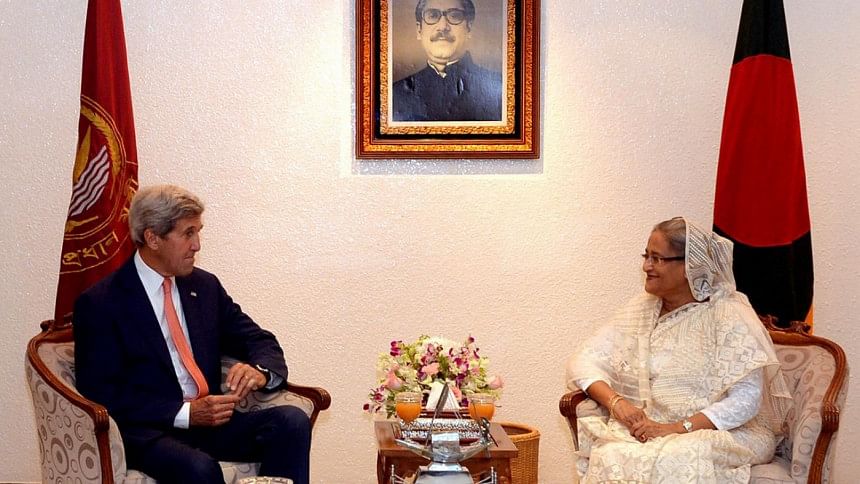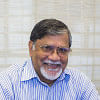John Kerry - important visitor, doubtful impact

MR. KERRY came to town. He has a heroic past, and a stellar background. He had volunteered to fight for his country unlike many others who had used deferments and trickeries to avoid going to war in Vietnam. A previous president, who had launched the war on Iraq on false pretenses, had used Daddy's clout to remain stateside; several prominent politicians, many of whom aggressive "chicken hawks" such as Dick Cheney, Newt Gingrich and others, had felt the"hunger for higher studies"so strongly that they needed to go to graduate school rather than serve their country at that time; and some used bone spurs in their feet (even though the current Republican nominee cannot remember which foot), as an excuse to dodge the draft.
It goes without saying that young men without the same wherewithal or connections were forced to serve as cannon fodder in that weary, unfair, bloody conflict. The fact that wars are fought by the poor for the interests of the rich was never as vividly demonstrated as it was in Vietnam.
But John Kerry was different. He received bronze and silver medals and three Purple Hearts for his valiant and distinguished military service in Vietnam. He gained enormous moral authority when he threw away those medals in an act of protest against a war which he understood was wrong, both on those on whom this was being waged, and for those waging it.
He graduated from Yale, received a JD from the prestigious Boston College School of Law, is multi-lingual (which makes him impressive abroad, but dooms him in Trumpland), married into the rich Heinz family (of Ketch-Up fame), and was one of the longest serving Senators in US history (1985-2013).
He became Secretary of State in 2013 which gave his naturally substantial "presence" even greater gravitas. The prospect of his visit to Bangladesh had,thus, left us duly excited and expectant.
Bangladeshis are peculiarly, at times embarrassingly, prone to defer to "foreigners" (particularly if they are Caucasian). We seek their approval, go to ridiculous lengths to prove our familiarity and friendship with them; fetishize "modernity"supposedly exemplified by them; embrace their concepts of beauty; incorporate their explanatory frameworks; appropriate their judgments; and bow to their expertise, regardless of the credentials of the said experts or the soundness of their proposals.
Imperialism may have ended, but its control over colonised minds continues, in more insidious forms, and greater local complicity. Today we have succumbed to the seductions of globalisation, and measure our self-worth according to the standards and categories supplied by others. We live derivative, self-loathing lives, no more than "mimic men" (that Naipaul had decried).
John Kerry strode into this easy and inviting milieu as a welcome and eagerly awaited guest. In fairness to him and his innate decency, he did not appear patronising and defied the image of the "ugly American" typified by many such emissaries. But, as Gertrude Stein would have reminded us, "there was no there, there".
There were no policy initiatives, no promises for now or the future, no aid, no investments, no inauguration, support, or blessings to any on-going or future project, no GSP facility, no greater access of Bangladeshi products in American markets, no prospect of any ease in issuing visitor visas, processing F-I student applications, or facilitating family sponsored immigration, no prospects for cultural contacts, and no decisions about extradition requests which have remained frozen since 2012. His speeches were "full of high sentence, but a bit obtuse" as Eliot would have put it, or in Shakespearean terms, were neither full of sound and fury, nor signified anything. His pronouncements about democracy were tired, and platitudinous, and his clichés on terrorism carefully balanced the "home-grown" narrative preferred by the Awami League, and the "foreign linked" causes suggested by many others.
But, he did have a magic touch. His praise of the Prime Minister's leadership, his visit to the Bangabandhu museum and his warm words in the visitors' book, and his upbeat message about Bangladesh, all constituted a deft rhetorical pat on the back of our ruling regime that lifted its anxieties about the controversial elections, its spotty, perhaps questionable, record on human rights and civil liberties, and its initially confusing, if evolving, struggle against extremism and terrorism. We felt accepted. We are vindicated. The US is with us.
To spread his largesse around, he met with Ms Khaleda Zia (in a rather unusual setting for an ex-Prime Minister) and again bleated well-worn banalities about the importance of free and fair elections, and pursuing popular rule through democratic means. He even shook hands with Ms Rowshan Ershad (a partner in the Awami League coalition and, paradoxically, the leader of the Opposition) in a brief and clumsily improvised encounter after one of his civic engagements.
John Kerry's visit accomplished pitifully little. Popular wisdom suggests that it symbolised much. Lacking both popularity and wisdom, I am not entirely convinced of that judgment. It is possible that his only purpose was to respond to a ruling regime seeking some legitimacy and respect. But there was apparently no pro to that quid, unless there were aspects to that visit which we don't know about. That raises awkward questions about diplomacy, transparency, and US interests in this area of the world. It also makes the visit seem less benign than it was made out to be.
Otherwise, John Kerry came as a flimflam artist more to reassure than to dazzle, more to be pleasant than to be consequential, more to offer photo-ops than to set tone or direction. If diplomacy is making someone happy without giving them anything, then John Kerry is a consummate diplomat. Some leaders, certainly in the ruling regime, and some in the opposition, were mightily pleased. The vast majority of us however, were left waiting for hours in the sweltering heat, wondering why traffic had stopped, and what this brouhaha was all about. We still have not figured it out yet. Our fear is that we never will.
As it now stands, this appeared to be no more than a "virtual" visit. A letter, an under-study (with a fulsome title), or even a computer-generated avatar could probably have achieved much the same results. It is only fitting that instead of a joint communiqué at the end of his visit, John Kerry issued a tweet.
The writer is Professor Emeritus, Black Hills State University, USA and may be contacted at [email protected].

 For all latest news, follow The Daily Star's Google News channel.
For all latest news, follow The Daily Star's Google News channel. 



Comments